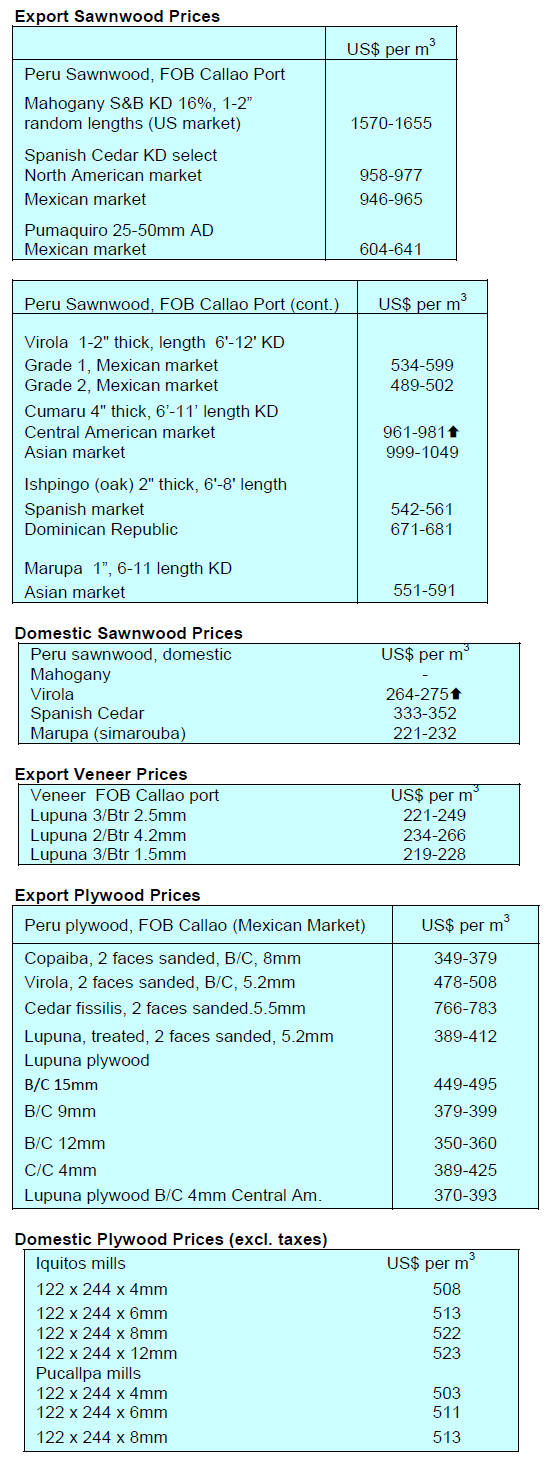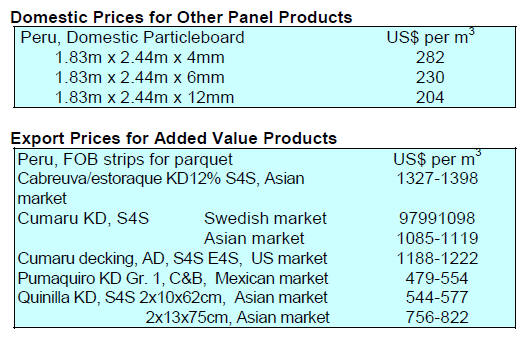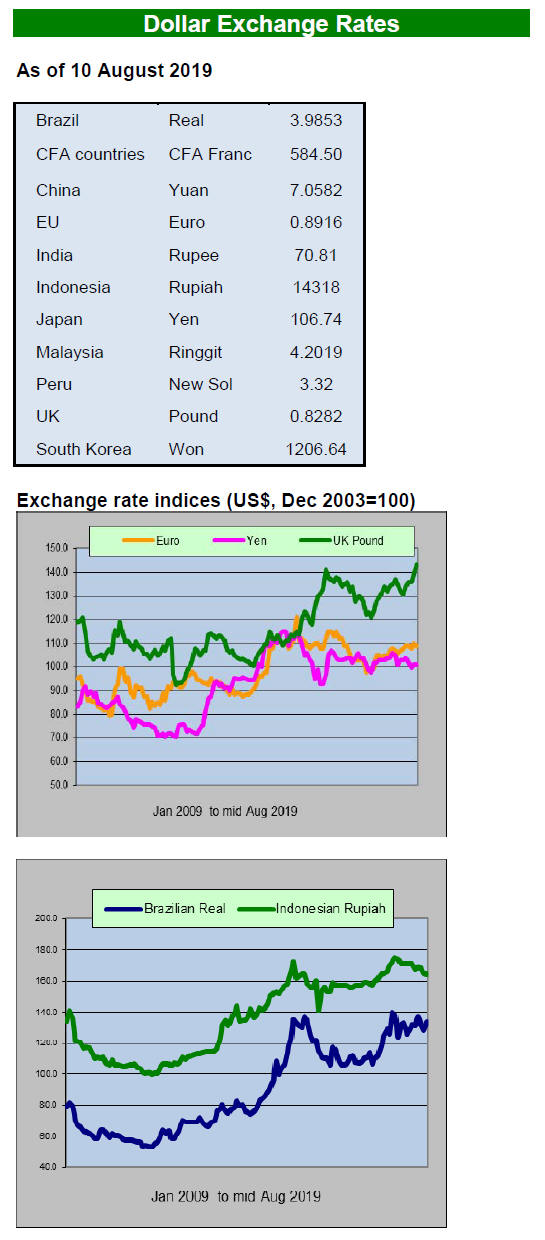3.
MALAYSIA
Optimism high that 2019 wood product
exports will be
a record
The government has reported that wood product exports
for the first 5 months of this year were up just over 2%
year on year. Based on this performance it is anticipated
that exports for the full year could exceed the RM22.3
billion recorded last year. Last year the wood products
sector contributed 1.6% to national GDP.
Forestry laws under review
Tengku Zulpuri Shah Raja Puji, Malaysia's Deputy
Minister of Water, Land and Natural Resources said that
the government is reviewing the current forestry laws and
will consider suggestions on amendments that would
strengthen forest protection.
In August environmental activists lobbied demanding
changes to the current decades old laws in order to
strengthen forest protection and to increase punishments
for forest-clearing, corruption and pollution.
One option being considered is closer coordination
between the central government and state administrations.
Under Malaysia's constitution, forest management falls
mainly under State not Federal control. Many complain
that this has led to greater focus on economic interests
compared to the environment or indigenous people’s right.
Forest fires in Sarawak
The current dry spell has resulted in several forest fires in
Sarawak, especially in the northern Miri area. In early
August forest and peat fires were out of control in Kuala
Baram and had extended over 600 hectares. Unseasonably
strong winds and dry weather contributed to the rapid
spread of the fires.
Malaysia will establish a National Action Plan for Open
Burning and refine the existing National Haze Action
Plan. In early August much of Malaysia was affected by
smoke as forest fires continued to rage in Sumatra and
Kalimantan.
Sarawak log Production
The Sarawak Statistics Department has released log
production data for the first five months of this year
showing an almost 7% rise compared to 2018. This data
has been met with scepticism in trade circles.
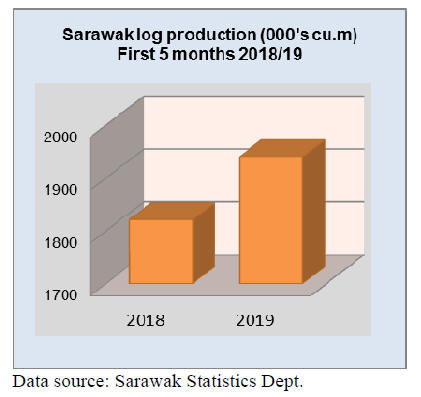
New head for MTC in Europe
In a press release the Malaysian Timber Council (MTC)
has announced it has moved its operations to Rotterdam
and appointed Agnes Seah as the new Regional Head of
MTC Europe.
As Regional Head of MTC Europe, Seah will oversee all
operations that represent MTC’s interest in the region.
MTC moved its operation from London to Rotterdam in
April to better facilitate trade-related matters in Europe.
See:
http://www.mtc.com.my/images/media/685/Press_Release_on_A
gnes.pdf
Plywood prices
Plywood traders based in Sarawak reported the following
June export prices.
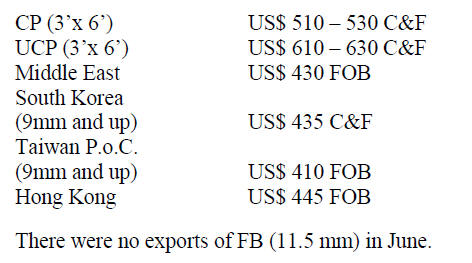
4.
INDONESIA
Vietnam a major competitor in
US furniture market
Indonesian furniture producers are unable to expand
market share in the US despite the tariffs on Chinese
products.
Based on data from the Indonesian Center for Reform of
Economics (CORE) in April 2018, when the US
Government began imposing tariffs on Chinese products,
the furniture market share of China in the US was 48%,
while Vietnam’s was 7.4% and Indonesia’s 1.63%. A year
later China's market share fell to 46%, while Vietnam’s
rose to 10.5% but Indonesia’s share did not change much,
rising to only 1.65%.
Mohammad Faisal, Executive Director of CORE
Indonesia said that Indonesia has adequate raw materials
so it should have taken advantage of the market
opportunity in the US. However, as he pointed out, there
are several reasons why domestic furniture products failed
to capture more of the market from China, one of which
that Indonesian exporters lack ability to identify market
preferences and lack skills to innovate.
See:
https://ekonomi.bisnis.com/read/20190801/257/1131279/furnitur
-vietnam-jadi-pesaing-berat-produk-indonesia
Attracting overseas furniture firms to Indonesia
The government has seen an opportunity in the trade
conflict between the US and China and is working to
attract Chinese furniture manufacturing companies to
move operations to Indonesia. The Head of the Investment
Coordinating Board (BKPM), Thomas Lembong, said
Chinese companies in Dongguan have been approached.
In addition to Chinese enterprises, efforts have been made
to attract companies in Taiwan P.o.C.
Community forests to be redefined to boost log
availability
The Ministry of Environment and Forestry (KLHK) plans
to redefine community plantation forests (HTR) as smallscale
industrial forest plantations forest (HTI).
To effect the change the Minister directed the Director
General of Social Forestry and Environmental Partnership
(PSKL), Bambang Supriyanto and Acting Director
General of Sustainable Production Forest Management
(PHPL), Bambang Hendroyono, to review regulations.
This change was decided upon as the HTRs have not
delivered the economic benefits expected and have not
been registered in the Forest Product Administration
Information System (SIPUHH) of the Directorate General
of PHPL making it difficult for owners to find buyers for
their logs. The Minister hopes that with the new
regulation, HTR will have the same business function as
HTI without a reduction in the social benefits.
The Association of Indonesian Forest Concessionaires
(APHI) added its support to the planned change which will
encourage community forest plantations to be managed as
small-scale industrial plantations. APHI Executive
Director, Purwadi Soeprihanto, said this change would
benefit plantation owners and has the potential to deliver
more raw materials for manufactures.
See:
https://ekonomi.bisnis.com/read/20190730/99/1130357/tingkatka
n-produktivitas-skema-bisnis-hutan-tanaman-rakyat-bakalberubah
and
https://ekonomi.bisnis.com/read/20190730/99/1130386/aphidukung-
rencana-pemerintah-ubah-skema-bisnis-hutan-tanamanrakyat
Permanent moratorium on forest permits
The Indonesian President has signed a Presidential
Instruction regarding the moratorium on forest area
permits. The Minister of Environment and Forestry, Siti
Nurbaya, said the moratorium is now permanent for
primary and peat forests. Previously the moratorium was
renewed every two years.
See:
https://nasional.kontan.co.id/news/presiden-jokowi-tandatanganiinpres-
moratorium-izin-hutan
https://republika.co.id/berita/pvw6rc383/pemerintah-hentikanpemberian-
izin-kelola-baru-hutan-primer
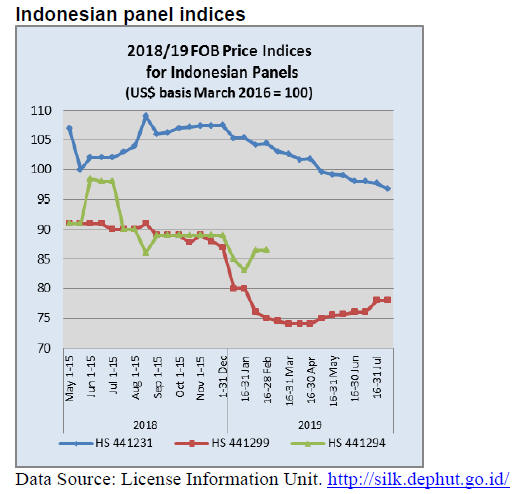
5.
MYANMAR
MTE facing slow sales of
hardwood logs
The Myanma Timber Enterprise (MTE) has said it is
holding as much as 40,000 tons of unsold inn-kanyin logs
from last years’ harvest. Inn-kanyin logs from Myanmar
are commonly used for plywood face veneer. The price of
first quality of inn-kanyin logs is between US$700-800 exsite
but at this price plywood manufacturers complain it
pushes production costs too high. Prices for teak and other
hardwood logs have been rising since a decision was made
to lower the annual allowable cut.
U Ohn Win, Minister of Natural Resources and
Environmental Conservation, has called on MTE to further
reduce in harvest levels in 2019/20 saying the harvest
should be just sufficient to cover the costs of logging.
The Minister also mentioned an age limit for teak harvests
and urged the planting of three seedlings for every tree
felled in Mandalay and Sagaing. The Ministry is also
planning support for the mahouts and working elephants
affected by the reduction in logging.
Myanmar Arbitration Center opened
For the first time a Myanmar Arbitration Center has been
opened at the headquarters of the Union of Myanmar
Federation of Chambers of Commerce and Industry
(UMFCCI). In the past the UMFCCI formed the mediation
committees to deal with commercial disputes between
business persons and merchants. Myanmar passed an
Arbitration Law in 2016 in order to solve commercial
disputes.
At the Arbitration Center opening ceremony, U Zaw Min
Win, President of UMFCCI, reminded Arbitrators not to
be biased as action will be taken against biased and
dishonest members. With the creation of the Arbitration
Center dispute resolution will become more transparent.
Union taxation law
The Parliament recently passed the Union Taxation Law
which set a tax of 10% on logs and sawnwood for export
and 5% for import ( export of logs from the natural forest
is banned). Manufacturers have urged the government to
reduce the tax on imports.
While it is understood the Ministry of Natural Resources
and Environmental Conservation is in favor of reducing
tariffs on the importing wood as manufacturers have a
hard time competing with products from neighboring
countries.
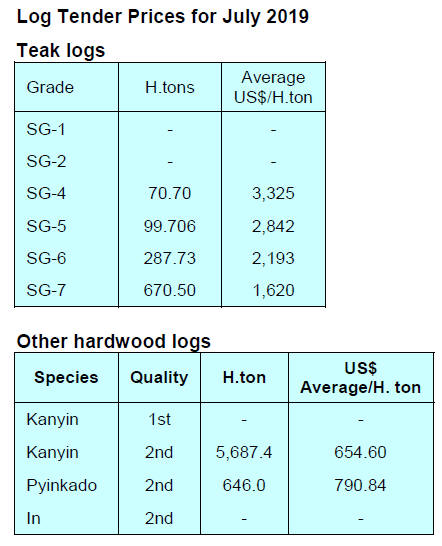
6. INDIA
Home buyers find some relief in
interest rate cut
India’s economy grew at its slowest pace in more than
four years in the January-March period, falling behind
China’s pace for the first time in nearly two years.
On the housing front, home sales in India’s main property
markets declined by 11% year-on-year in the first quarter
(April June) of the current financial year. During the same
period housing starts dropped almost 50%.
Home buyers will welcome the cut in interest rates by
India’s largest lender State Bank of India (SBI) and other
lenders following the decision of the Reserve Bank of
India to lower interest rates.
In related news, the government is planning construction
of 18 million new homes with electrictity supplies and
fittings for cooking gas to fulfill an election promise to
rural voters.
Plantation teak imports
Optimism amongst teak importers was dented recently as
the rupee slipped by around 4% against the dollar driving
up import costs. Against this background, and with no
decision on easing the advance payment conditions under
the Goods and Services tax rules, C&F prices are stuck at
the same level as a month ago.
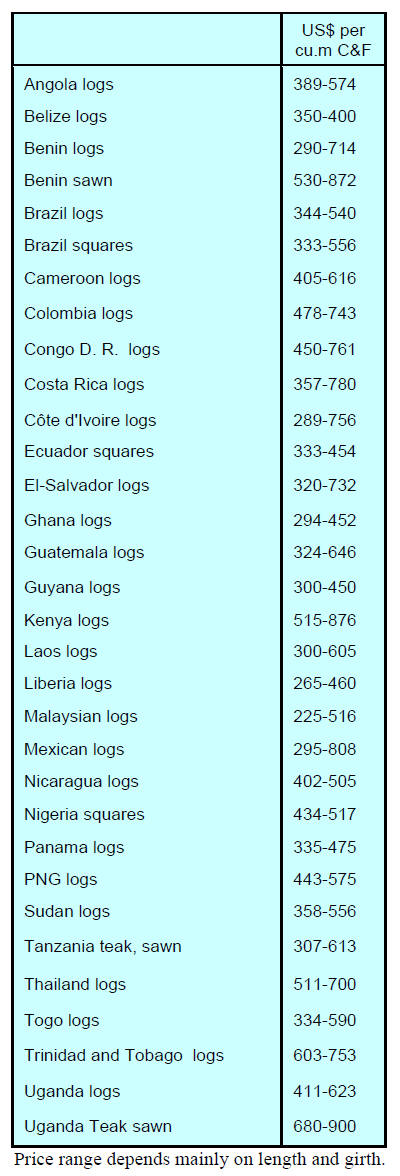
Locally sawn hardwood prices
While demand and import levels are balanced traders
report severe market competition such that prices, while
steady, are under pressure.
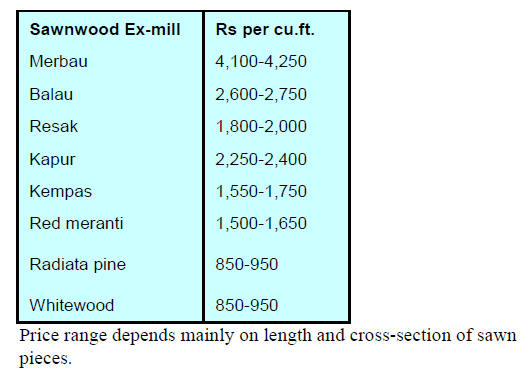
Myanmar teak prices
Analysts report that weakening demand levels reported
earlier continued into early August citing the sluggish
housing market and dampened consumer sentiment
because of political issues.
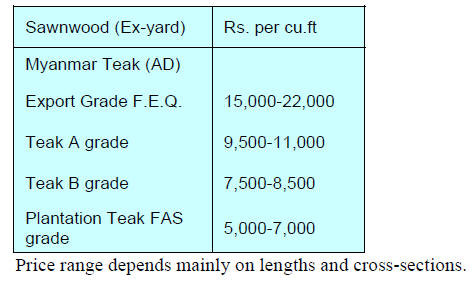
Sawn hardwood prices
No changes in demand or prices for imported European
and US hardwoods has been reported.
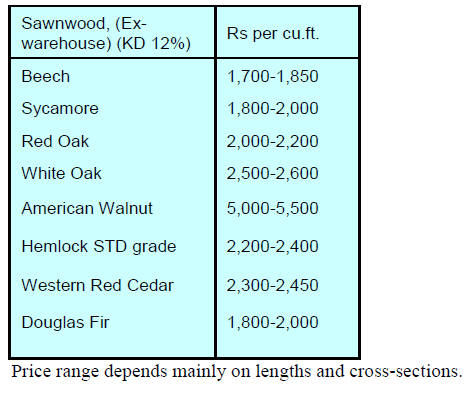
Plywood
Millers report continued increases in production costs
driven by rising log costs and wages. The increases have
now become so high that wholesale prices have been
increased.
The various plywood manufacturers associations
collectively decided to increase prices by around 7% as
shown on the right.
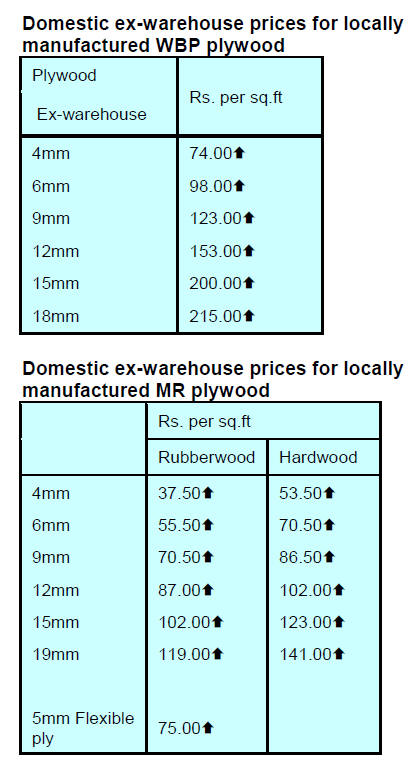
7.
VIETNAM
Rubberwood – a major raw
material in Vietnam
Rubberwood has become an important raw material for
Vietnamese wood product exporters. Over the past few
years clearing of rubberwood for replanting has yielded a
volume of between 4.5 and 5 million cu.m of roundwood
and some 70% of this is utilised by manufacturers.
In 2017, exports of rubberwood products were worth
around US$1.7 billion accounting for almost 25% of
Vietnam’s wood products exports.
In the future this source of raw material will have
sustainable forest management certificates and CoC
documents to satisfy demands for legality verification.
The greater use of rubberwood will sharply improve the
supply of raw material for Vietnamese manufacturers.
Piloting Vietnam’s Forest Certificate System
In order to certify 20,000 hectares of plantation forests in
accordance with the Vietnam Forest Certification System
(VFCS), the Vietnam Administration of Forest and
Vietnam Rubber Group (VRG) plans to coordinate with
sector stakeholders to ensure Vietnamese wood product
manufacturers meet the standards set in the VFSC for
sustainable management and for CoC.
The Vietnam Rubber Group has already signed an
agreement under which about 12.000 ha. of rubberwood
will be certified.
To build upon this effort the VRG and its members
organised training activities for stakeholders on (i)
building capacity to understand and implement CoC and
certify SFM (ii) Planning the roadmap to achieve CoC (iii)
summiting documents to verify SFM and CoC.
See: http://tapchicaosu.vn/tin-tuc/thoi-su-trong-nganh/tong-cuclam-
nghiep-se-ho-tro-vrg-cap-chung-chi-rung-cho-10-000-hacao-
su.html
Calls for long-term plantation plan
Forest plantations play a vital role in the national wood
processing industry and Nyssaceae (dogwood) is utilised
commercially. Due to intense pressure on manufacturers to
secure raw materials Nyssaceae trees are being harvested
after just 5-7 years and this has raised concerns as felling
at such an early stage diminishes the economic potential of
the plantations.
To address the issue of Nyssaceae harvesting, Ha Cong
Tuan, Deputy Minister in the Ministry of Agriculture and
Rural Dvelopment (MARD), signed a Decision (No. 2962)
providing regulations for Nyssaceae harvests.
The new regulations are seen as demonstrating the
determination of government to improve the current
obstacles in the national wood processing industry and to
promote sustainable harvesting and export of certified
wood products.
According to the Forestry Administration worth wood
product exports were almost US$7 billion in the first 6
months of 2019.
The General Statistics Office (GSO) has reported that in
the second quarter of 2019 the central plantation forest
area was estimated at 78,000 ha a decline of around 5%
compared to the same period of 2018. These plantations
produced around 7 million cu.m.
See: http://fpabinhdinh.com.vn/tinh-hinh-xuat-nhap-khau-go-vasan-
pham-tinh-den-trung-tuan-thang-7-2019/
8. BRAZIL
Furniture sector strategy to promote
export
There is a prominent furniture cluster in Bento Gonçalves
and the Bento Gonçalves Furniture Industry Union
(SINDMÓVEIS) has started to support training in export
marketing.
The first training course focused on export-related issues
such as risks and costs, production capacity, quality and
brand image as well as tax incentives for exporters. Other
topics include global market strategy and development,
international marketing plans and promotion of Brazilian
brands abroad.
In comments to the local media a spokesperson for
SINDMÓVEIS said the first export training programme
involves four seminars until year end.
Drop in June domestic furniture sales
After an almost 16% year on year increase in May 2019
domestic furniture sales fell in June, the first decline in the
second quarter. Up to May this year the accumulated sales
growth was around 8% and the annualised rate rose
slightly.
Export update
The value Brazilian exports of wood-based products in
June 2019 (excluding pulp and paper products) fell 12%
year on year from US$263.4 million to US$230.6 million.
The value of June 2019 pine sawnwood exports dropped
around 5% year on year (2018 June US$45.5 million and
2019 June US$43.4 million). In volume terms exports
increased 11% from the same period in 2018 from 214,200
cu.m to 237,700 cu.m.
Tropical sawnwood exports also fell in June dropping 14%
in volume, from 47,400 cu.m (June 2018) to 40,800 cu.m
in June 2019. But in terms of value exports dropped
almost 19% from US$19.1 million to US$ 15.5 million.
The downward trend in exports continued with pine
plywood which recorded a 36% fall in the value of exports
in June 2019 in comparison with June 2018, from US$60.8
million to US$38.7 million. Export volumes also fell but
by a lesser amount dropping 10% from 173,700 cu.m in
June 2018 to 155,700 cu.m this June.
The decline in exports was even more severe for tropical
plywood as export volumes fell 39% and export values
dropped a massive 46% from 11,600 cu.m (US$1.2
million) in June 2018 to 7,100 cu.m (US$ 2.8 million) in
June 2019.
Adding to the bad news, wooden furniture export earnings
fell from US$49.1 million in June 2018 to US$43.4
million in June 2019, an almost 12% decline.
Furniture production in Rio Grande do Sul higher than
national average
The July 2019 report on Brazil’s foreign trade in furniture
published by the Market Intelligence Institute (IEMI)
shows that between January and May, 2019 furniture
production in Rio Grande do Sul expanded around 8%,
higher than the national industry average.
According to the Brazilian Institute of Geography and
Statistics (IBGE), over the past 12 months furniture
production in Rio Grande do Sul expanded around 8%
while at the national level there was a decline. The three
southern states, Santa Catarina, Rio Grande do Sul and
Paraná are the top 3 in terms of furniture exports
accounting for 86% of the national total. A further 10% is
exported from São Paulo.
The main export markets in June were the US, with 18%
of exports, followed by the UK, 13%, and Uruguay, 13%.
In June there was a spike in exports to Bolivia.
Strong demand for pulp lifts Mato Grosso do Sul
exports
According to the Mato Grosso do Sul Federation of
Agriculture and Livestock (FAMASUL) during the first
six months of 2019 forest product exports from the state
increased by 12% over the same period of the previous
year.
According to FAMASUL this increase was due to the
increased international demand especially from China
which accounted for about 60% of all wood product
exports. There is a large area of eucalyptus plantations in
Mato Grosso do Sul extending over around 1 million
hectares and exports are mainly of wood pulp.
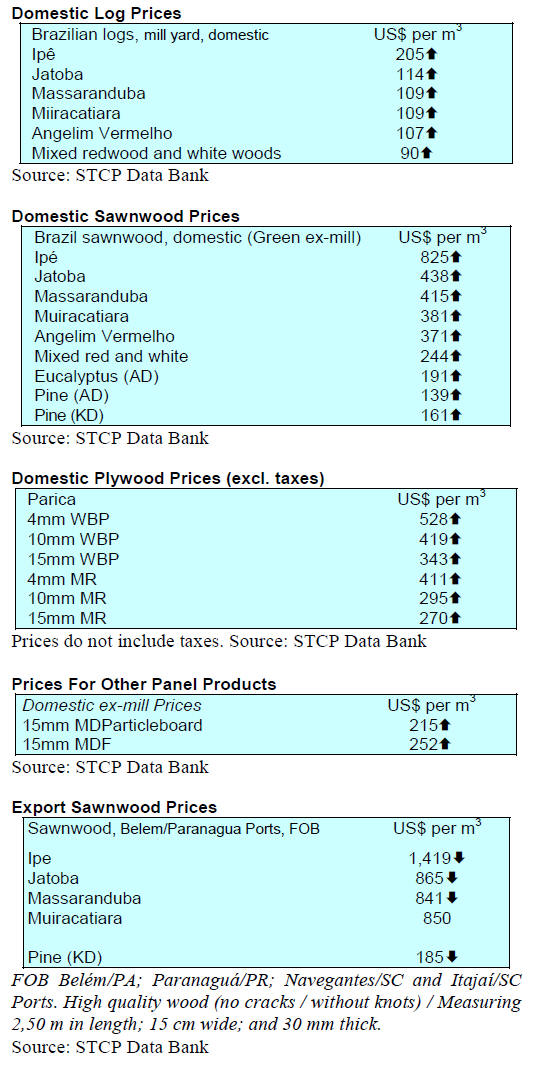
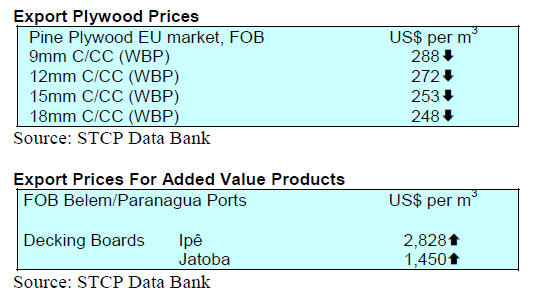
9. PERU
New President for exporters
association
The Association of Exporters (ADEX) has announced the
resignation of its president Alfonso Velásquez. In
accordance with the association’s constitution the first
Vice President, Erik Fischer, will assume the leadership of
the export union and will serve until 31 March 2021.
Fischer, according to ADEX, is a promoter of forest
governance in Peru and defender of the Forest
Development Executive Board agenda. This is the first
time that ADEX has a president specialising from the
forestry sector.
Promoting the use of legal wood products
Taking advantage of the 2019 Pan American and Para-Pan
American Games to be held in Lima the National Forest
and Wildlife Service (SERFOR) will mount a campaign
‘Casa Peru’ with the aim of promoting the use of legal
wood products. It is government policy to prioritise the
forestry sector because it has high economic potential.
The theme of ‘Casa Peru’ is to promote the domestic use
of legal wood in architectural projects and for wooden
items for the home. Samples have been manufactured from
wood from well managed forests and come with details of
traceability and are for display to the public.
The use of Amazonian species such as capirona, anacaspi,
shiahuahuaco, quinilla, yacushapana and others, which are
sustainably managed, will be exhibited.
Particleboard imports up 13%
Between January and May 2019 Peruvian imports of
composite panels were worth US$42.23 million, a 13%
year on year increase. Ecuador was the main supplier
followed by Chile and Spain. Recently producers in Brazil
have secured market share in Peru.
Forest fires a challenge for SERFOR
According to SERFOR more than 30 forest fires have been
reported over the past month. Fires have been reported in
the Departments of Amazonas, Cusco, Apurímac, Puno,
Ancash, Huancavelica, La Libertad and Ayacucho. Some
fires were burning in the altimontano mountain forest, an
ecosystem that is very vulnerable to fire, but these have
been controlled. Forest fires in the country are mostly
caused by farmers clearing the land.
